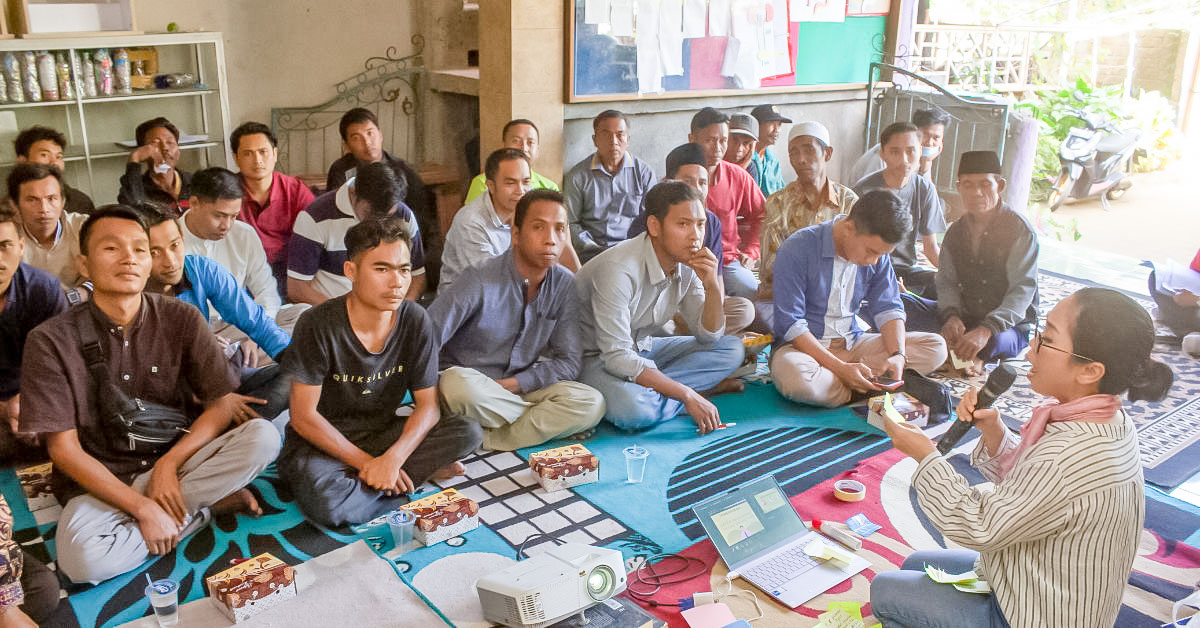In Indonesian villages, men learn how to support their wives in their businesses
Date:
Author: Pertiwi Triwidiahening, Radhiska Anggiana, and Nadine Hassan.
Jakarta, Indonesia — The man, who lives in Lantan village in North Lombok, said he was sorry for the way he had treated his family. After attending UN Women's Gender Equality Training for Male Partners, he realized how wrong his actions were.
"Looking back, I regret acting rude towards my wife and children. And seeing the effort that my wife put in to take care of our family while running a business, I want to change my attitude and be more supportive." he said.

The gender equality training was part of the training on Entrepreneurial and Digital Skills with Gender Perspective for Women Entrepreneurs organized by UN Women's Together Digital Programme, in collaboration with the Indonesian Ministry of Women's Empowerment and Child Protection.
Together Digital is funded by Ant Foundation, a private charitable foundation set up by Ant Group. The programme supports women-led micro, small and medium-sized enterprises in Indonesia and China to participate and thrive in the digital economy. The five-year programme began in January 2022.
In Indonesia, Together Digital trainings were held in six villages in Lombok island, West Nusa Tenggara province, that are part of the Ministry's Women and Children Friendly Villages programme: Lantan, Mas-Mas, Teniga, Jenggala, Sesaot and Bengkel.
The women's businesses in these villages include cafes, barbershops, selling of pre-paid cards for cellular services, tailoring, groceries, and fashion.
The main barrier these women face in trying to grow their business is gender bias, including in unpaid care work in their households and gaps in entrepreneurial, digital and leadership skills, and networks and access to finance.
"The entrepreneurship sector in Indonesia is shifting towards digitalization and focusing on making a positive social and environmental impact. However, women entrepreneurs face numerous challenges, including the significant time they must spend on unpaid care and domestic work," said Pertiwi Triwidiahening, National Programme Officer for Women Entrepreneurship, UN Women Indonesia. "Through this training, we hope to create a more supportive and inclusive environment for women to start and grow their business,"
Each of the women received three days of training on entrepreneurial and digital skills, gender and women's leadership; these trainings took place during July and August 2022.
Each of the 240 male partners or family members of the women received one day of gender equality training; these trainings took place during August and December 2022.
The training encouraged the men to change their behaviour and build more equal relationships in their households. The men learned about the impact of gender bias on women, men's roles in the family, women's workload in the family, and the importance of equally sharing unpaid care work. In other words, the men learned how to be supportive partners for the women as they tended their business ventures.
Yuni Hari Seni, S. Pd, head of Mas-Mas Village, said: "It is evident that men should receive education regarding the importance of gender equality, and this programme is a positive move towards achieving this goal. The aim of this training is to promote mutual respect and appreciation for people of all genders and create a supportive environment."
She said she hoped that other people in the community could also receive the training.